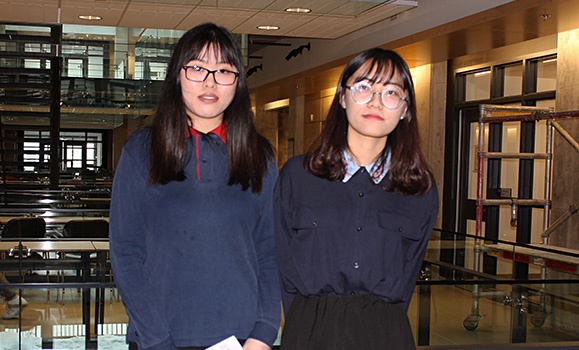How we enjoy music has changed drastically over the last century, from live concerts all the way to digital downloads. Now, there is a new trend in the music industry: streaming.
Third-year Economics students Xaiowen (Vicky) Qu and Haolin (Emma) Shao teamed up to explore the topic for this year's ESL Student Conference: International Perspectives on Economics, Arts, and Science.
“Everyone has access to a streaming service like Spotify,” said Qu. “They’ve had enormous success in the American music market.”
The pair hypothesize that streaming will be the largest source of revenue for the music industry for the next decade.
“Music is a powerful thing,” said Qu, “It has the ability to change people’s attitudes.”
International perspectives
Music was just one of the topics featured at the event put on last Wednesday by the College of Continuing Education and the Department of Economics's China Program.
The conference, now in its sixth year, is an opportunity for students taking Academic Writing and Research Skills (ENSL0005) to showcase their research and have meaningful discussions on the international perspective of art, science and economics.
Forty students from Science, Economics, and Arts & Social Sciences presented at the event on subjects ranging from the Chinese high-speed railway system to the future of Marvel movies.
“Conferences like these are important, especially for International students,” said Carolyn Watters, Dal's provost and vice president academic. “Dalhousie has students from 110 countries and five of those are represented at this conference.”
Dr. Watters expressed the importance of an international perspective. “Starting any university is a big step, but attending university in another language is a really big step. It’s great for students to come together and share what they’ve learned.”
The event began with speeches from Dr. Watters, Andy Cochrane (dean of the College of Continuing Education), Professor Talan Iscan (chair of the Department of Economics), and David Packer, director of ESL Programs, who read a message on behalf of Barry Lesser (director of the 2+2 China Program.) It also featured an introduction from a current ESL Economics student Yi Xuan Wu and Science student Abdulrahman Alhadlaq.
Wu spoke about his experience in the ENSL course. “I’m a math student, so I didn’t expect the class to be helpful,” he said. “But I was wrong. We practiced how to use English in an academic setting and how to cite our sources.”
A beneficial experience
After hearing the speeches, students separated into concurrent sessions where they could listen to presentations on topics they were interested in. The amount of hard work the students put in was made clear during their presentations.
“We’ve been working on this for a few weeks” says Qu, “We had a lot to prepare.” Qu and Shao agreed that one of the most difficult parts was answering audience questions. “We had to really know our topic."
Qu and Shao’s presentation led to a thoughtful discussion of piracy, quality of music, and the streaming industry in China. “Streaming is a win-win model,” says Shao. “Spotify has over 16 million users that no longer have to download their music.”
Qu mentioned that the research process allowed her to practice her English in a new way.
“When you’re just talking, you aren’t always correcting your grammar. But, when you have to do academic research, language is very specific. It was a very beneficial experience.”
Comments
comments powered by Disqus

